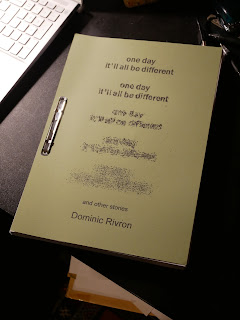A few of the stories were written earlier, but the vast majority have been written over the last eighteen months. They explore time, memory, the way we create the worlds we live in and the unknowability of other people. Suitable themes, you might think, for a pandemic lockdown. I was about to say that, despite that, I wouldn't describe it as a work of 'lockdown fiction', but as soon as I began to type out this thought I began to question it. None of the stories feature the pandemic, the characters meet freely, travel the country and explore their environments. However, the very things they do are the very things lockdown leads one to think about and perhaps yearn for. Several of the stories, too, involve characters becoming immersed in the topography of their immediate surroundings. This, I think, has also been one of the less unpleasant themes of the pandemic for a lot of people. So, is it a work of lockdown fiction? Perhaps it's not for me to say.
One of the great things about writing short stories is that, because they're short and self-contained, you can be bold. If you have an idea, explore it. Why not? In two or three thousand words' time you'll be doing something else. Short stories can be a liberation not only for the writer but also for the reader. Not enjoying the narrative? Don't worry, in a few pages you'll be embarking on a new one. Very occasionally (but, be reassured, if such things are not to your taste, not too often), it might lurch away from literary fiction into a hauntological world drawing on the tropes of fantasy or science fiction.
It's a good feeling, getting it printed out: it's reassuring to see the thing on paper and feel the weight of it in my hand.
Mr. Pepper went on to describe the white, hairless, blind monsters lying curled on the ridges of sand at the bottom of the sea, which would explode if you brought them to the surface, their sides bursting asunder and scattering entrails to the winds when released from pressure, with considerable detail and with such show of knowledge, that Ridley was disgusted, and begged him to stop.
"It’s the philosophers, it’s the scholars,” [Richard Dalloway] continued, “they’re the people who pass the torch, who keep the light burning by which we live. Being a politician doesn’t necessarily blind one to that, Mrs. Ambrose.”
“No. Why should it?” said Helen. “But can you remember if your wife takes sugar?”

